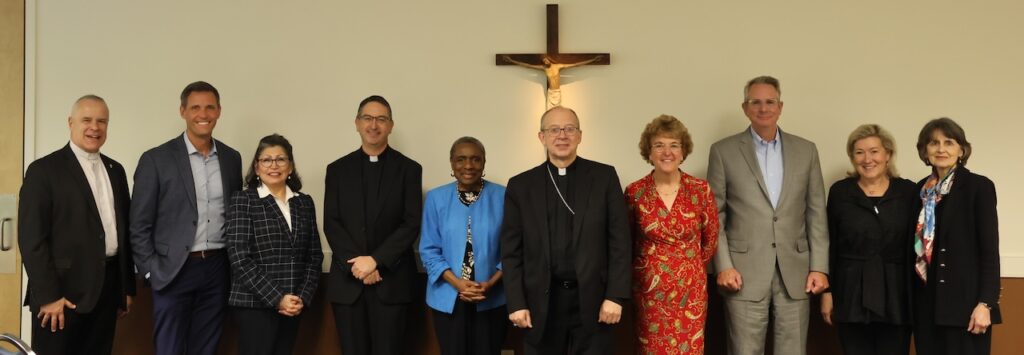For 10 years, the Catholic Community Foundation (CCF) has overseen fundraising efforts in our diocese. CCF coordinates the Annual Appeal, the McMahon Parater Scholarship Foundation, and the Segura Educational Initiative; it also oversees legacy giving, including the Lumen Christi Legacy Society, and supports parish and school endowment funds.
To better undertake this great responsibility, CCF launched a strategic planning process to prepare for the next 10 years. Since November, six commissions have been meeting to discuss potential recommendations for change.
“In the last 10 years, as a foundation, we have grown a lot,” said Deacon Adrian Marchi, who serves at St. Stephen, Martyr, Chesapeake, and is the current chair of CCF. “We manage more funds, and there are more people involved.”
“There are many changes going on in the world, in our communities, in the diocese,” he continued. “This is an opportunity to rethink, refine our strategy, and see what other goals we want to target.”
The six commissions – composed of 140 people in total – are Communication, Ecumenical and Interfaith, Engaging the Next Generation, Governance, Hispanic Stewardship and Development, and Stewardship and Development.
“We need to improve our storytelling,” said Cynthia Kelly, chair of the commission on communication. “We do so many good things through CCF – it has a positive impact on the lives of children, on parish priests, on people in nursing homes. We want to do a better job of telling that story.”
Kelly’s husband, Robert, is chair of the commission on engaging the next generation.
“The first task is to bring young people into better contact with the Church,” he said. “Obviously, the differences in how each generation interacts with other people have to be addressed. This is a generation where the internet and various social media are front of mind.”
He pointed to other foundations’ use of technology as an example: “If you look at St. Jude Hospital [social media], every day, you’ve got a post where they show a problem, show an answer, and say, ‘Help with this.’ That’s where we need to go.”
Deacon Marchi noted that the technological changes of the last 10 years were an issue that repeatedly surfaced in group discussion. Another change for CCF would be assigning official responsibilities to certain commissions.
“We want to have an opportunity for people to participate in CCF, to accomplish something for society,” said Deacon Marchi. “Placement on a commission would be based on someone’s skills and interests.”
Again, other foundations’ success stories can provide a blueprint for CCF, he said.
“We want to revisit our structure; there are very successful Catholic fundraising foundations that function as governance boards, not just advisory boards,” he said. “That would require larger participation as well.”
A few model organizations, said CCF director Margaret Keightley, include the Catholic Community Foundation of Cleveland, Dynamic Catholic, William & Mary Foundation, and Williamsburg Community Foundation. Since November, the six CCF commissions have been reaching out to these organizations for interviews and guest speaker appearances.
On March 25, Deacon Marchi, Keightley, and the six commission leaders met at the Pastoral Center, Richmond, with Bishop Barry C. Knestout to discuss their findings and the future.
“In culture, in society, things are completely different from 10 years ago,” said Deacon Marchi. “We are at a flex point.”

